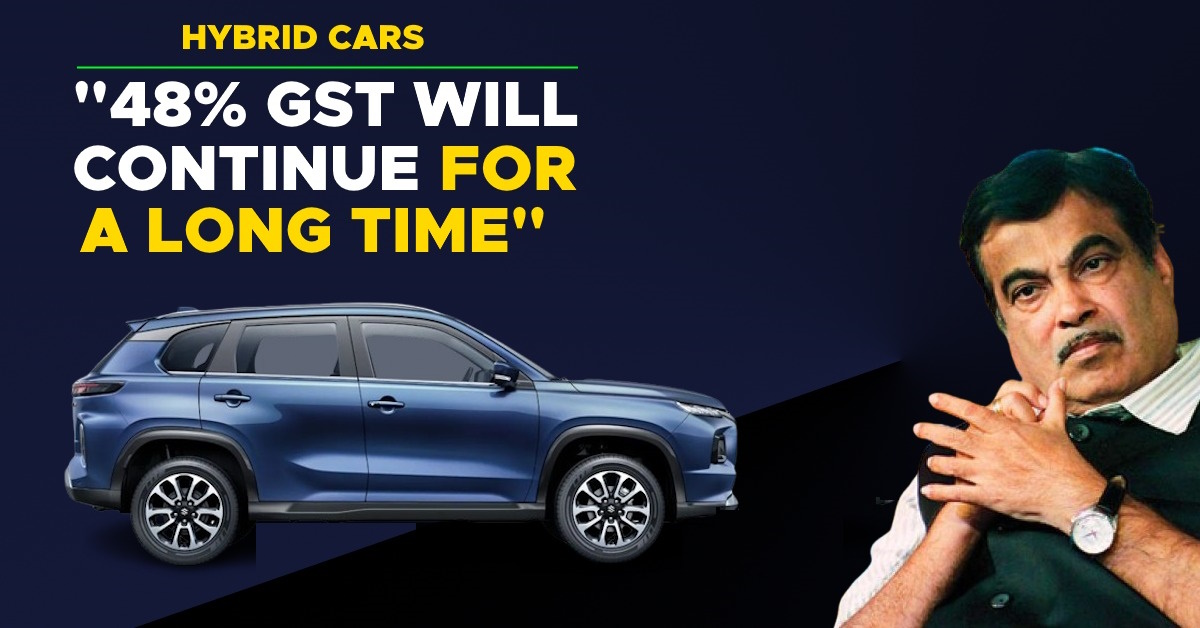48% GST on hybrid vehicles will continue, says Ex-Niti Aayog Chairman Amitabh Kant


The Indian government has no plans to reduce GST on hybrid cars, according to the ex-chief of Niti Aayog Amitabh Kant, who is now the Sherpa of G20. He added that the 48 % GST on hybrid vehicles is intentional and here to stay for a long time. A strong votary of electric vehicles, Mr. Amitabh Kant said that the 5 % GST on electric vehicles is a policy move meant to make the country shift towards electric vehicles across all categories including cars, two wheelers and even trucks.

Mr. Kant was previously the chairman of Niti Aayog (known as Planning Commission previously), the arm of the government that devises policies for various goals. These comments were made during a recent media interaction at the 2nd edition of ‘Sustainability Dialogues’ organised by Mercedes-Benz. Now that Mr. Kant has specified why the Indian government will not reduce GST on hybrid vehicles, let’s examine the various reasons he thinks GST should not be reduced on hybrid vehicles.
Car penetration in India is currently very low compared to that in developed countries. In India, car penetration stands at 24/1000 people compared to say 1,100/1000 people in the USA, and 950 per 1,000 people in Europe.
This presents a big opportunity for India to directly move towards electric vehicles instead of using hybrid vehicles as a bridge technology before full electrification.
Lowering GST on hybrids would mean more people buying hybrids and a delay in electrification of vehicles sold in India. This is something that the government is trying to avoid by keeping GST high on hybrid cars, and low on electric vehicles.
India imports bulk of its fuel requirements such as petrol and diesel. This reliance on fuel imports is bad for the country as it results in valuable foreign exchange being spent for purchasing fuel from oil producing nations around the world.
By reducing the fuel import bill, the government can use revenue on development projects within the country. This is why the Indian government is pushing for electric vehicles over petrol, diesel and hybrid vehicles.
Conventional fuel powered vehicles that run on fossil fuels such as petrol, diesel, CNG, LPG, and even petrol-electric hybrid vehicles, produce tail pipe emissions that adds to air pollution.
By reducing and eventually eliminating such vehicles from Indian roads, air pollution can be greatly reduced. Moreover, using renewable energy instead of thermal power to generate electricity will mean that electric vehicles are a lot cleaner than fossil fuel powered vehicles.

Union transport minister Nitin Gadkari has been a strong votary of lower GST on hybrid cars. In fact, he even requested union finance minister Nirmala Sitharaman to reduce GST on hybrid cars. Nirmala Sitharaman in turn said that the various states of India need to come to a consensus on the GST cut on hybrid vehicles before she can actually effect any change in taxati0n.

A 58-year old automobile enthusiast and businessman, Piyush Bhutani, took the Uttar Pradesh government to court over its electric vehicle policy, and got a judgment in his favour. This resulted in the UP government waiving road tax on hybrid cars, making them significantly cheaper in India’s largest state of Uttar Pradesh.
Most state governments have withdrawn attractive tax benefits that they previously used to offer on electric vehicles. Even the union government has discontinued subsidies on electric cars that used to be offered under the Faster Adoption And Manufacture Of Electric Vehicles (FAME).

This has made electric vehicles more expensive than before, and has resulted in a significant sales slowdown. Bellwether Tata Motors, which holds over 60 % of the electric car market in India, has seen year-on-year electric car sales tumbling by 10 %. The decline in month-on-month electric vehicle sales has been sharper, with over 20 % reduction. Even in the two wheeler space, market leader Ola Electric has seen a sales slowdown despite aggressive discounting.
The electric car sales slowdown in India mirrors a global trend where buyers are shifting back to petrol/diesel and hybrid cars. This doesn’t have to do just with lower subsidies on electric cars. Electric charging infrastructure remains a challenge. Then, there are concerns about the rare metals used in EV batteries and their disposal, and also resale value of end-0f-life electric cars. All these factors are causing a slump in EV sales.

While some automakers, mainly led by Tesla, continue to bet big on electric vehicles, most others are heavily scaling back on electric car plans. For instance, Toyota chairman Akio Toyoda, has insisted that electric cars can be one of the many propulsion technologies for automobiles, and not the only technology. He’s even called total electrification of electric cars as ‘madness’.
Swedish automaker Volvo, now owned by Chinese car giant Geely, previously announced that its entire car range would be pure electric by 2030. Now, even Volvo has gone back on these plans, announcing recently that it would have hybrid cars in its car range even after 2030. Mercedes Benz, BMW and Ford are all cutting back on electric car investment in a big way.
Many other car makers such as Maruti Suzuki, Hyundai, Kia and Toyota are placing their bets on hybrids – specifically series hybrids where the actual drive is by an electric motor but whose battery is recharged by a small petrol engine. This eliminates range anxiety but also adds to the complexity as we now have an engine and a electric motor powering a car.
All in all, the automotive industry is in a state of flux so far as electrification is concerned, and it’ll be a while before a clear direction emerges. As for the car buyer, fossil fueled cars, including hybrids are here to stay at least for the next 10 years.